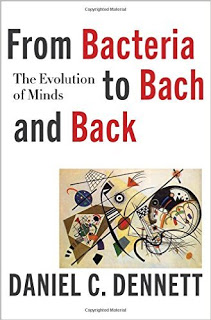

| Online: | |
| Visits: | |
| Stories: |

| Story Views | |
| Now: | |
| Last Hour: | |
| Last 24 Hours: | |
| Total: | |
From Bacteria to Bach and Back: The Evolution of Minds by Daniel C. Dennett
Wednesday, April 5, 2017 3:24
% of readers think this story is Fact. Add your two cents.
Daniel C. Dennett’s From Bacteria to Bach and Back: The Evolution of Minds is an attempt to explain how human minds and the concept of consciousness came to be. This book is a hybrid of natural science, social science and philosophy. Dennett is both a philosopher and a cognitive scientist. I have also read his Consciousness Explained. That work was written in 1991. In many ways, this recent book builds on the earlier work.
This book consists of Dennett laying out and interpreting how he believes minds, both human and animal, evolved. The author covers the origins of life, the evolution of life, brains and cognition. Eventually, Dennett moves on and explores the theory of memes. For those unfamiliar with the theory behind memes, it postulates that human ideas and culture can be broken down into small ideas. Such ideas spawn new ideas, compete with one another, sometimes thrive, sometimes die out, etc. Memes evolve in a way that are similar to genes. Thus, human culture and ideas evolve in a Darwinian fashion. Dennett contends that much of what we consider the human mind and consciousness can be attributed to memes.
This book is very technical in some parts. I found some of it to be difficult to comprehend. The author presupposes a basic understanding of such concepts as evolution, basic biology and other aspects of basic science. I found that most of the science and other technical aspects of the book to be understandable. However, occasionally, the science and technical parts of the book became obtuse. For instance, at one point in the text the author delves into concepts related to Bayesian Probability. I went into this book knowing what Bayesian probability is, and I had a very basic understanding of the concept. However, this rudimentary knowledge turned out to be insufficient for me to fully follow all of Dennett’s arguments. With that, I understood the majority of the science presented in this work.
Where I was most challenged was in my ability to follow all of Dennett’s philosophy and reasoning. A reader more versed in modern philosophy would likely have done better here. With that, even when I had difficulty comprehending particular points, I was usually able understand the main arguments being made and compartmentalize the arguments that I could not understand.
It is important to note that this book comprises a lot of opinion. Dennett has all sorts of ideas on scientific and technical subjects that are not settled. To his credit, in an effort to refute arguments and theories that he does not agree with, the author often presents beliefs that counter his own with some detail. For instance, though many scientists and philosophers embrace the theory of memes, many do not. Dennett is a strong believer in the theory. Despite this, the author elaborates detailed augments against memes.
Towards the end of the work, Dennett lays out his theory of the mind and consciousness. Dennett's approach is Materialist. He believes that most of what goes on in our brains are automated processes that we have neither access to nor control over. What we consider consciousness is but one “system” that came about though evolution of genes and memes. This conscious system exists primarily to communicate with others. Dennett reasons that we must be able to analyze our own inner mental processes in order to convince, cooperate, compete and interact with other individuals Dennett goes further and speculates that what we call consciousness is mostly illusionary and mainly consists of false explanations of our actions and hidden thought processes.
Dennett acknowledges that his ultimate theory seems difficult to accept. I agree that it is difficult to accept. With that, I think it is important to note certain things about Dennett’s argument. First, the idea that consciousness might be illusionary is somewhat popular with some, but not with all scientists and philosophers who are exploring the human mind. Second, Dennett has a scientific mind, and he admits that he has not fully proven his hypotheses and is making educated guesses based on evidence. He spends the bulk of the work building both evidence and arguments for his beliefs. Finally, he spells out why, assuming that his model is valid, people would reject it based upon human bias. He writes,
“You might be a zombie, unwittingly taking yourself to have real consciousness with real qualia, but I know that I am not a zombie! No, you don’t. The only support for that conviction is the vehemence of the conviction itself, and as soon as you allow the theoretical possibility that there could be zombies, you have to give up your papal authority about your own nonzombiehood.”
“Zombie” is a term used commonly by scientists and others who explore consciousness. It more or less describes people, animals or machines that are not conscious. The above quote is referring to the fact that people might argue that they have free will and consciousness, but have minds that really only consist of automated process.
Though I am far from convinced that Dennett’s ultimate conclusions are valid, I acknowledge that he has built a compelling case. In addition, the book is filled with lots of real science and intriguing philosophy and insights that are worth exploring.
I have read several books and a lot of articles on the human mind and consciousness, and I think that it is important to keep in mind that there are many views and theories that relate to these issues. Many views are similar to Dennett’s, but many are different. For some alternate theories on the these subjects, I recommend David Chalmers's The Conscious Mind. Chalmers believes that there is something very special about consciousness that is embedded in the Universe itself. This approach is known as Dualism. His book is fascinating but difficult.
I recommend this book to readers who are not afraid of challenging books. In my opinion, it works best as part of a broader reading plan dedicated to consciousness. At this point, it cannot be considered the final word on this topic. With all of this, in the right context, this is a fascinating read on one of the most intriguing and important of scientific and philosophical topics.
This is a blog about good books. It is a place for me to share my musings about literature, history, culture and science. Most of what one will find here are not plain reviews. Instead, when I discuss a book I tend to explore a thought or two that I have about the work. This is a place for the enthusiastic reader who is curious about the world!
Source: http://briansbabblingbooks.blogspot.com/2017/04/from-bacteria-to-bach-and-back.html



